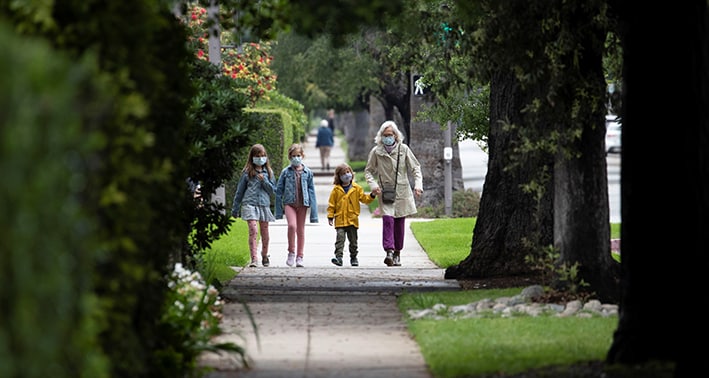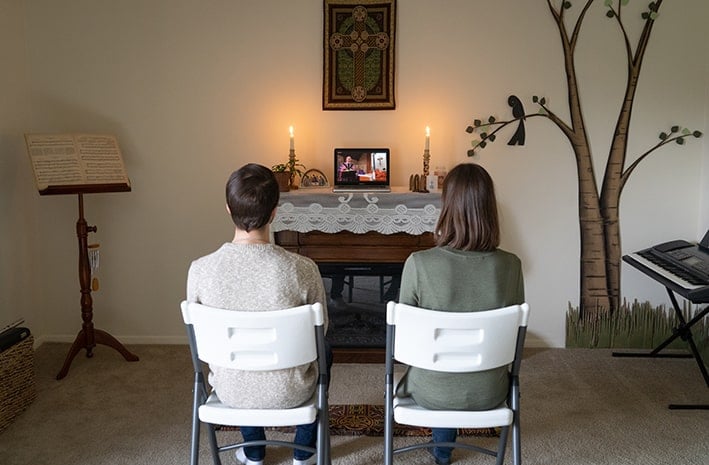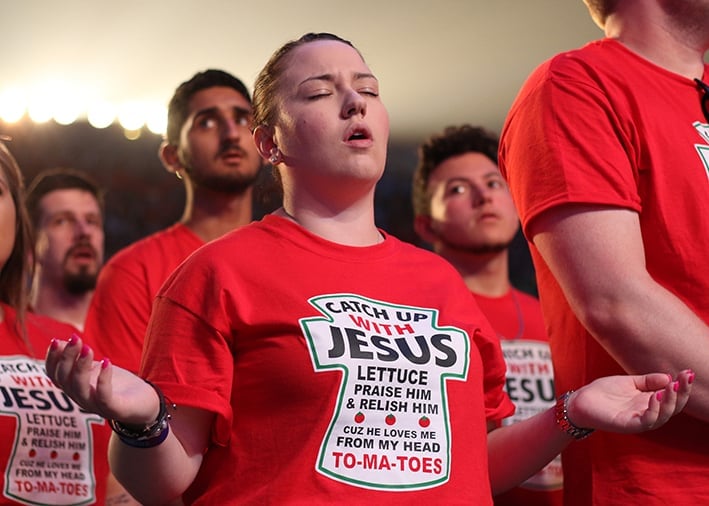
What are the implications of the current pandemic for the way in which people will live, work and worship in the future and how, therefore, will it reshape our approaches to evangelisation and mission as a Church? As we read through this crisis for hints of a future, the shape of the ‘new normal’ appear to gravitate around themes of conversion, communion and commission.
Much will be changed
What is clear is that little will be left untouched by this global crisis, from social policy and healthcare to our service industries and work practices. The rhythms of family life have been disrupted and a sense of local neighbourhood intensified, while the ways we engage digital infrastructure, undertake education and learning, and order our daily priorities have changed.
Little will be left untouched by this global crisis, from social policy and healthcare to our service industries and work practices
It is a mark of this upturned reality that physical distance has resulted in new forms of solidarity as much of the world huddles at home ‘alone together’. Ambitious calendars have been cleared and replaced by responsibilities more ordinary, like grocery shopping and homeschooling now imbued with a heightened intensity.
Ordinances to stay inside are for the most part observed, for our own safety but also, and significantly, to protect others from ourselves. Contactless delivery and self-service bring a disquieting comfort to everyday transactions. For many, work has changed, people are being paid to stay at home while others have been left without.
The principle of adaptation
In this strange and unchosen landscape, the Church cannot afford to read off old maps, at least not if the mission to bring people to Christ and Christ to people has higher priority than our methods. It is evident that placing already-tired parish programs or the parish bulletin online do not amount to a ‘new evangelisation’. To reach the unreached we have to adjust our eyes of faith in real time and seek out opportunities to engage the deeper questions and desires of our time with the leaven of the Gospel.
Invitation to a deeper interior life
Whatever pretence of normality that we might seek to insert into our routines – whether that is the crafting of home schedules or dressing up for bunkering down – the deeper reality of this crisis is a plunge into an interior life that reveals itself on the surface of things.
Hoarding and panic buying reflect neither practical need nor an external threat but are attempted antidotes to uncertainty within. Price-gauging manifests opportunism driven by greed while the gluttony of overconsumption at home – whether food, alcohol, online shopping or entertainment – can represent meagre consolation for deeper hungers that remain. As St Augustine intimated long ago, our restlessness invites a pilgrimage to deeper, divine sources of the self.

A moment to speak up – and out
The Church has an opportunity to engage with the felt absences of this time and the concomitant desire for personal presence by proclaiming the fullness of Christ’s Risen life. It is a moment also for bold witness to the fullness of life in Christ, a life which embraces one’s neighbour as one’s other self.
The proliferation of livestreamed Masses locally and abroad has been just one expression of this mission of proclamation and presence, quite literally reaching people ‘where they are’ and bringing faith and worship into the homes of Catholics and other Christians, of occasional attenders, and the spiritually curious. It bodes well for a future of evangelisation more attuned to a method of ‘go and tell’ rather than simply ‘come and see’ and one that is increasingly confident to step into the cultures that digital technology has created.
The digital frontier
Our mission in the time to come will be to make the Gospel, centred as it is on encounter, an incarnate reality in this digital landscape. Repeating truisms does not secure engagement of the people we want to reach and runs the risk of irrelevance. As the saying goes, just because the Gospel is relevant does not mean that we are. If our online interactions become self-referential, insular or rarefied we will be left talking to ourselves, conversation partners within a self-affirming Catholic subculture while the wider culture moves on largely untouched and unmoved by the claims of Christian faith.
Learning from this time, the evangelising community of the future must “be realistic and not assume that our audience understands the full background to what we are saying, or is capable of relating what we say to the very heart of the Gospel which gives it meaning, beauty and attractiveness” (Evangelii Gaudium 34).
The proliferation of livestreamed Masses locally and abroad has been just one expression of this mission of proclamation and presence
As well, this time of spiritual openness, manifest in the proliferation of online searches for “prayer”, provides us with fertile ground in which to plant the seeds of hope that can bring about conversion. Rather than a sentimental whim, an encounter with hope truly reaches others.
Hope rather than optimism
Of course, hope includes a faith-filled expectation that there is more than the limitations of the present. More deeply, however, our hope flows from our faith. It springs from a conviction that we are subjects of God’s personal concern and that God in the Risen Christ offers each one of us a future. It is this future that radically changes our experience of the present. We do not so much ‘hold’ hope as we do live it.
Acting as witnesses to this ‘assurance of things hoped for’ (Heb 11:1), we can provide to others not merely technically proper care but what people most deeply need. Whether over the fence to our neighbour, in contact with those anxious, those suffering in isolation or a heartrending loss, we can bring humanity and personal concern. Much more than outward necessities, we can give to the suffering, the lonely and despairing “the look of love which they crave” (Deus Caritas Est 18).
Ambassadors of Jesus, ambassadors of the Word
It is by such accompaniment that people are drawn to the reason for our hope, to the active presence of God in the world in Jesus Christ. It is such bearers of hope, ‘ambassadors for Christ’ (2 Cor. 5:20), who will now and post-pandemic open the doors to spiritual seeking and conversion, to the difference that faith can make in a changing and at times capricious world.

Calling the World to Communion
A further possibility to which the current crisis may give rise is a deeper appreciation of community. This includes within the Church. Ecclesial communion is assured not merely by the fact of people being together but by how its members relate and belong to one another and to Christ as one Body. It is apparent that those parishes and communities of faith without a strong culture of personal belonging and outreach before the COVID-19 crisis, let alone a database, social media tools or a continued sense of community through their week, have felt the effect in this new situation.
The Church’s ability to witness to communion will be significant in a post-pandemic world because personal encounter has become regrettably suspect. In just a matter of weeks, all have become potential carriers of contagion. In addition to the escalating death toll, economic collapse and resulting inequalities that it will entrench, the ugly legacy of coronavirus may extend to ethnonationalism and an upsurge in racism of which there are already signs – the attribution of a historical event to whole groups of people.
If the fruits of globalisation were not already subject to distrust in the light of a fragile European Union, and resurgent nationalism in countries including the US, China, and India, the current crisis will place further pressure on the paradigm of a global and interconnected world.
The work begins locally – in our own lives
Eschewing the temptation to isolationism, the Church must work locally against a breakdown in social relations and the identity politics that seeks to define one against the other.

Given the damaging effects of intra-Catholic polarisation, enmity and tribalism on the Church’s witness it can seem a stretch to recommend the contemporary Church as a sign and sacrament of unity. However, the catholicity that we have been given in Christ, found as concretely as in the local parish, is precisely that which it has to offer to the contemporary world.
Catholicity and the person – without boundaries
Imaged in the Book of Revelation this catholicity is marked not by cultural homogeneity, as can result from globalisation, nor the separation or tribalism to which we can all be tempted, but the multitude of “every nation, from all tribes and peoples and languages, standing before the throne and before the Lamb” (Rev. 7:9). It is the Church’s reverence for the natural unity of the human race, and its allied mission to call humanity, whole and entire, to supernatural unity with God, that renders our community of faith a real sign of communion for the new world arising.
A crisis – and a moment of opportunity
As we cast our eye to the future, we should not overlook the lessons of the present. The Church, as a community of memory, takes note of the ways in which God touches upon human itineraries at this time of upheaval. Following this global pandemic our communities cannot simply return to ‘business as usual’ or limit its concerns to the ecclesiastical. The global phenomenon that is unfolding before our eyes has exposed the inner absences and desires of lives derailed by calamity and uncertainty, as well as centrifugal forces that threaten future relations between groups, communities and even nation states.

New ways of proclaiming an unchanging faith
More positively, it has surfaced new ways of belonging and we have been able to do things as Christians, parishes and dioceses that once seemed difficult, ancillary, were thought better delayed or even plain impossible. Just as traditional care settings have moved to telemedicine in the wake of this crisis, so too can the Church exercise its perennial mission to proclaim and embody the healing and life-giving presence of Christ by new methods of evangelisation and pastoral care.
By inserting a renewed sense of urgency to our mission, this cataclysm has removed from our path artificial obstacles to new endeavours and underscored the part each of us can play as the baptised in the rebuilding of the new world that awaits.
As the theologian Joseph Komonchak concludes, “To enter the Church is not to leave the world, but to be in the world differently, so that the world itself is different because there are individuals and communities living their lives because of, in, and for the sake of Jesus Christ”. It is this Christian conviction and concrete hope we offer to our world in this wintry season, as disciples of Jesus ‘sent’ for such a time as this.
Related
